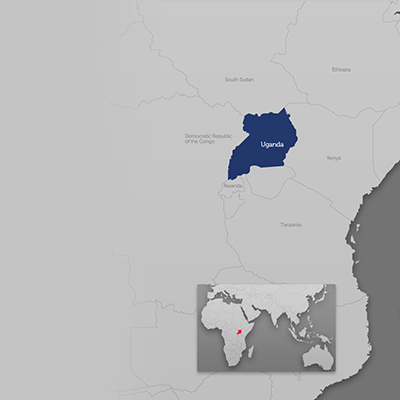

RMF ensures that malaria testing kits and regents are available.
Current Situation
Background and Statistics
Like any country in sub-Saharan Africa, Uganda is struggling to beat malaria, with a current prevalence rate of 19%. In Uganda, the highest incidences of malaria are recorded in the districts of Apac and Oyum, which neighbor Kiryandongo Refugee Settlement where RMF is implementing a primary healthcare program. RMF has been a UNHCR partner in the settlement since 2008, and we have continued expanding our team and services to support the settlement’s growing population, which has now reached over 100,000. To effectively implement this program, RMF is running 4 stationary health facilities and numerous outreach posts in Kiryandongo Refugee Settlement. The stationary health facilities include Panyadoli Health Centre III, Panyadoli Hills Health Centre II, Nyakadot Health Centre II, and the Reception Centre Clinic.
Malaria Prevention and Treatment
In Kiryandongo Refugee Settlement, the fight against malaria remains urgent: 65% of outpatient consultations are malaria cases, and 60% of our inpatient admissions are cases of severe malaria. 75% of these admissions are children below 5 years of age and 10% are pregnant mothers. On a wider scale, it is reported that most deaths in Uganda are caused by severe malaria, especially when victims delay reporting to a health facility. RMF is fighting malaria using both preventive and curative strategies:

RMF Uganda’s skilled laboratory teams test and detect malaria.
Preventive Strategy
Education and Distributions
We are implementing the following preventive measures to save lives in the refugee and host communities of Kiryandongo Refugee Settlement:
- Every morning, health education is provided in the outpatient departments. Here, patients and family members are taught malaria prevention strategies: to clear brush around the home, remove stagnant water near the home so that mosquitos don’t have breading grounds, and sleep under a treated mosquito net.
- In the health facilities, all patients sleep under treated mosquito nets.
- Every year, RMF and partners conduct massive mosquito net distributions, followed by mosquito net installation exercises.
- RMF has created strong Village Health Teams (VHTs) that help to mobilize residents of the settlement and educate them on how to prevent malaria, identifying those are sick and linking them to a health facility with delay.
- In order to prevent malaria in pregnant mothers, Fansidar tablets are given to all pregnant mothers in their second and third trimesters.
- Health workers are provided with additional knowledge on the management of malaria, mostly during continuous medical education sessions that are conducted the health facilities on a weekly basis.

RMF ensures that there is a sufficient buffer stock of antimalarials.
Curative Strategy
Medications and Emergency Services
To save the lives of those who have contracted malaria in the refugee and host communities of Kiryandongo Refugee Settlement, RMF employs the following curative measures:
- We ensure that sufficient antimalarials are stocked at the facilities, including artemisinin-based combination therapies (ACTs) for simple malaria and injectable artesunate for severe malaria.
- RMF also ensures that adequate malaria testing kits and reagents are available at the facilities.
- To ensure effective emergency services, 3 standby ambulances are available to provide rapid response.

- To serve as a health care implementation partner with the UNHCR and Ugandan Government
- To provide health care services to over 100,000 refugees and persons in the community via the Panyadoli Health Centres
- To provide skills training for South Sudanese refugees to enable them to become self-reliant
The Kiryandongo Refugee Settlement in Bweyale, Uganda, is a UNHCR managed refugee settlement that provides shelter, land, and support for more than 100,000 people. They are comprised of refugees from Kenya, DR Congo, Rwanda, Burundi, and South Sudan. RMF has partnered with UNHCR in supporting Kiryandango Refugee Settlement, the surrounding community of Bweyale, and the greater Kiryandongo District (an additional 266,197 people) with health care, education, and vocational training since 2008.

More Reports on: Kiryandongo Refugee Settlement Project Archive
Country Page: Uganda
Initiative Page: Kiryandongo Refugee Settlement Project
